Fashion
‘The Entire Conversation Needs to Change’: Reproductive Justice Leaders on the Fight for Abortion Access
Published
4 years agoon
By
Terry Power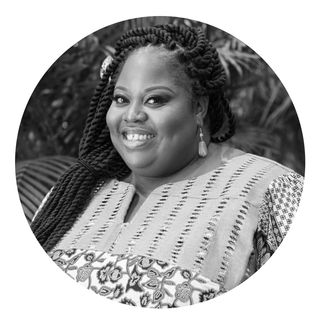
On Sept. 1, Senate Bill 8 went into effect, banning abortions in the state of Texas after about six weeks of pregnancy with nearly no exceptions, becoming the most restrictive abortion law in the nation. The Supreme Court, with its conservative majority, failed to block the law, so even with a Democrat in the White House and a Democrat-led Congress, millions of women and transgender and non-binary people had their rights stripped away from them like a thief in the night. But for those who have been paying attention to the changing Court and as state-level lawmakers have consistently worked to restrict abortion access, especially over this past year, the news from Texas comes as little surprise. It was an onslaught years in the making, yet few heeded the warning.
Reproductive justice leaders on the front lines have long been sounding the alarm about conservatives consolidating power at the state level, leading to this year’s widespread attacks on abortion access and voting rights. Now, with the midterms fast approaching, we can’t afford to lose voters to burnout and disillusionment. Instead, we have to listen to the leaders who’ve been working around the clock to ensure people have safe and destigmatized access to healthcare. We have to have a new, robust, mainstream conversation about reproductive justice—about where we are failing and where we can still succeed. We have to ground people in the true stakes of this fight and make clear who will be most affected by these restrictive policies. Regardless of the outcome of any one election, we must always be out in the streets, participating in and advocating for the future we want.
To do so, ELLE.com brought together four Black and Latinx women who’ve all had a front row seat to the national struggle for abortion care—and have been directly impacted themselves. Below, these healthcare consultants, advocates, and practitioners discuss the devastating effects of this Texas law and what we can do now to change course.
What was your initial response when the Supreme Court failed to stop this Texas law?
Courtesy
Angela Doyinsola Aina, MPH, co-founder and executive director of the Black Mamas Matter Alliance: At the root of this racist, heteropatriarchal law is white supremacy. SB 8 not only prohibits most abortions after six weeks of pregnancy but also empowers individuals to sue anyone who aids or abets a person accessing an abortion, including doctors, staff, drivers, and other community members. We know that Black mamas, their families, and communities will face the most dire consequences as a result of these types of laws that restrict their fundamental rights to comprehensive reproductive and maternal healthcare.
All of a sudden, your friends and family are debating the morality of abortion on your timeline or in your group chats, sometimes not knowing they too know someone who has had an abortion.

Courtesy
Ana Lucia Carmelo, MPH, healthcare consultant, public health advocate, and proud Peruvian immigrant: We know that abortions continue to happen even when they are not legal, and these type of bans disproportionately impact the underserved. It can be easy to feel hopeless, and events like this are especially triggering for people who have had abortions. All of a sudden, your friends and family are debating the morality of abortion on your timeline or in your group chats, sometimes not knowing they too know someone who has had an abortion. That being said, I always think about the quote by Mariame Kaba, “Let this radicalize you rather than lead you to despair.” After allowing myself time to get informed and feel my feelings, I looked for ways to get involved: donating to Texas abortion funds, amplifying messages from activists and community organizers on the ground in Texas, and vocalizing my support for abortion access.
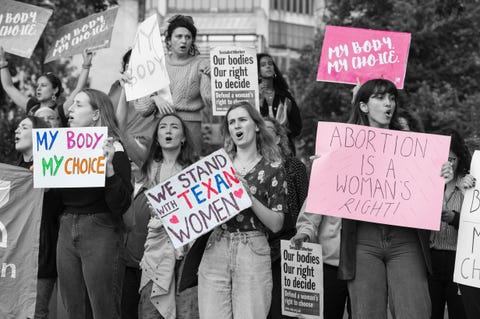
Barcroft MediaGetty Images
What personal or professional experiences have shaped the way you approach this work?

Courtesy
Cynthia Adriana Gutierrez, first-generation Nicaraguan Salvadoran and reproductive justice organizer: My personal experience of having an abortion at 22 years old has been at the forefront of how I approach this work. At the time of my abortion, I left an abusive relationship, was experiencing housing insecurity, lacked a steady income to support myself, and was living with a substance use disorder. Then, I learned I was pregnant. It was all too much to bear, and having an abortion was the best decision for me. I have no regrets and no shame around it. Being an abortion storyteller with We Testify, an organization meant to foster the leadership of people who had abortions, has transformed my work.
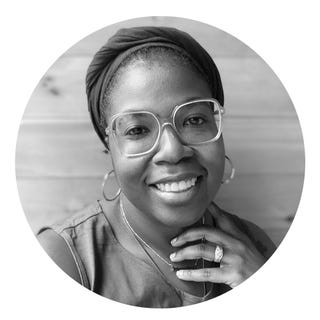
Courtesy
Chanel Porchia, founder of Ancient Song Doula Services: The stories of my grandmother having multiple miscarriages before having my mother, my sister having a child as a teenager and seeing how she was treated within her care, my own reproductive health experiences from my early 20s, into motherhood, and now into perimenopause. How was I made to feel in every instance of my care? Was it centered in informed consent? Did my grandmother have room to not feel shame when talking about her reproductive struggles? These questions were and continue to be foundational [for me] in centering the voices of others in their reproductive health choices.
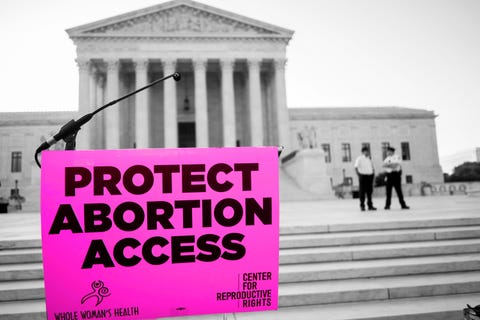
Pete MarovichGetty Images
The way we discuss reproductive rights and abortion access has long been debated. In what ways are we still failing to intentionally talk about this topic?

Courtesy
Ana Lucia Carmelo, MPH, healthcare consultant, public health advocate, and proud Peruvian immigrant: A major failure that comes to mind is the need to find a perfect victim. Folks really emphasized the fact that the Texas law would impact rape and incest victims, especially children. But why does support and empathy have to be conditional? I understand that part of it is to get folks who would not otherwise support abortions to see the worst case scenario of the law, but ultimately that perpetuates the stigma around abortions and makes folks continuously have to justify why they chose to have one. If we only agree with abortion in these worst case scenarios, we are saying that people only deserve bodily autonomy, empathy, and access to abortions once their bodies have been violated. We cannot be content with the bare minimum of legality without critically considering what care, empathy, and access look like for people who get an abortion.
If we only agree with abortion in these worst case scenarios, we are saying that people only deserve bodily autonomy, empathy, and access to abortions once their bodies have been violated.

Courtesy
Cynthia Adriana Gutierrez, first-generation Nicaraguan Salvadoran and reproductive justice organizer: When it comes to speaking on reproductive justice—the human rights framework centering people of color in ensuring we all are able to decide if, when, and how to grow families free from violence and coercion—and abortion access, we must always prioritize people with lived experiences. We are the experts of our own lives and are the most qualified to shut down false narratives. I hope the Court listens to us. It’s shameful that BIPOC women who have abortions are not prioritized in the national conversation. There needs to be a more intentional attempt to include the voices of abortion storytellers with disabilities, parents, those who are undocumented, and queer, trans, and gender non-conforming folks.
How do you see Black and Latina women specifically being erased from this national conversation yet again?

Courtesy
Chanel Porchia, founder of Ancient Song Doula Services: Through the intentional silencing of our voices due to a lack of uplifting community-based organizations that directly work with those most impacted. When policymakers, organizations, and others don’t center those most impacted, we already know that the agenda was never set in our favor, but rather continues to center privilege and access through the white gaze. Organizations like SisterWeb, Ancient Song, Mamatoto Village, Birthmark Doulas, Kindred Space LA and more have been working tirelessly to center their communities, and that directly comes from listening and meeting people where they are, not where we think they should be.
Black women and our Latinx sisters are no longer asking to be heard, and out of necessity, we are now formulating our own standards of care.
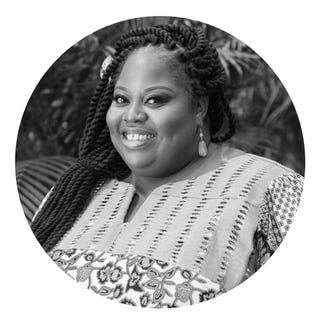
Courtesy
Angela Doyinsola Aina, MPH, co-founder and executive director of the Black Mamas Matter Alliance: Black and Latinx women have long been ignored, along with their reproductive rights advocacy work. The fact that there’s a long history of reproductive coercion, obstetric violence, and denial of quality care experienced by Black and Latinx women in the U.S. is a further injustice. Black women and our Latinx sisters are no longer asking to be heard, and out of necessity, we are now formulating our own standards of care. That is what the Black Mamas Matter Alliance is about. We have created a space and network that centers Black mamas’ rights to advocate, drive research, build power, and shift culture for Black maternal health, rights, and justice.
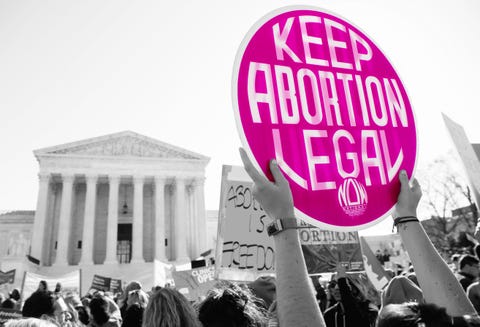
SAUL LOEBGetty Images
With SB 8 in place, and the upcoming Supreme Court case that directly threatens Roe, many are discussing what a post-Roe America might look like. At a time when abortion is already so inaccessible, what’s your perspective on this?

Courtesy
Ana Lucia Carmelo, MPH, healthcare consultant, public health advocate, and proud Peruvian immigrant: A lot of people currently live in places where Roe v. Wade exists merely in statute; an abortion is not an attainable reality for them due to costs, lack of nearby facilities, or poor quality care. The possibility of Roe v. Wade being overturned is concerning, especially for BIPOC, but legalizing abortion is only one piece of what it would mean to make abortion accessible and destigmatized. Putting meaning behind phrases like “abortion is healthcare” or “my body, my choice” rests on complete access to affordable, dignified, and empathic reproductive healthcare. There is so much about how healthcare works in this country that is related to who we are, what we look like, and where we live. In my own experience getting an abortion at Planned Parenthood, it became clear to me just how impersonal abortion care can be, even in a “progressive” city like New York: the metal detectors upon entering, the lack of Spanish translators, the shuttling back and forth between rooms with no explanation, the open concept recovery rooms with no privacy, the constant mispronunciation of my name. A hyper-focus on protecting Roe v. Wade without considering the consistent access and quality issues that exist disregards the lived experience of so many people who have had an abortion. We need to protect the right to abortion, yes, but we also need to ensure that abortions are humanized, dignified, and accessible to any person that wants one.
What is the most important or impactful thing we can do to shift the tide of abortion access? What or who needs to change?

Courtesy
Chanel Porchia, founder of Ancient Song Doula Services: The entire conversation needs to change to understand that reproductive healthcare access in the United States is an embarrassment, to say the least, and needs to be addressed on a systemic level. When we continue to separate the full spectrum of care that individuals need at certain points in their reproductive life, of course it is Black, brown, and Indigenous peoples who feel the burden. Black, brown, and Indigenous birthing people and those seeking reproductive health services access deserve to be seen, heard, and loved.

Courtesy
Ana Lucia Carmelo, MPH, healthcare consultant, public health advocate, and proud Peruvian immigrant: Collectively, I believe the single most important or impactful thing we can do to shift the tide of abortion access is to pass universal healthcare. Radically reimagining healthcare is such an important aspect of access. We have examples where a different world is possible: free COVID-19 vaccines for everyone, for instance. This is on policymakers, but we have seen that they have no impetus to make progress without pressure from us.
Reproductive healthcare access in the United States is an embarrassment, to say the least, and needs to be addressed on a systemic level.

Courtesy
Cynthia Adriana Gutierrez, first-generation Nicaraguan Salvadoran and reproductive justice organizer: There are so many ways you can get involved, such as driving people to their appointments, making sure they have gas money, helping out with childcare or translations, and offering your home to folks who are traveling for multi-day procedures. And of course, continue donating to Texas abortion funds: La Frontera Fund, Lilith Fund, Texas Equal Access Fund, West Fund. You can donate to all of them at once here.
These interviews have been edited and condensed for clarity.
Brea Baker is racial and gender justice activist working locally and nationally towards the liberation of all oppressed people with an emphasis on Black people and women.
This content is created and maintained by a third party, and imported onto this page to help users provide their email addresses. You may be able to find more information about this and similar content at piano.io
You may like
-
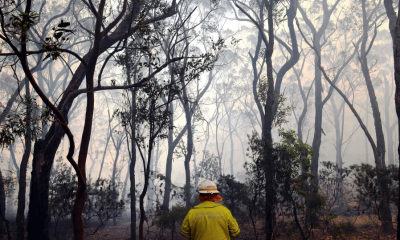

The Download: how AI could change politics, and lifting the lid on Facebook
-
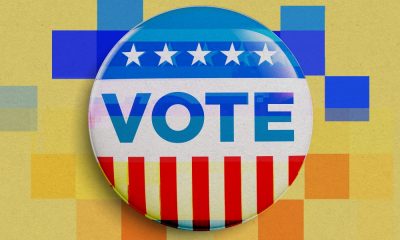

Six ways that AI could change politics
-


Want agency in the AI age? Get ready to fight
-


How tech companies got access to our tax data
-


Here’s what we know about lab-grown meat and climate change
-


The Catholic cartographer who wants to help the church fight climate change
Fashion
Jennifer Lopez Joined Ben Affleck In L.A. With Kids For Thanksgiving
Published
4 years agoon
26 November 2021By
Terry Power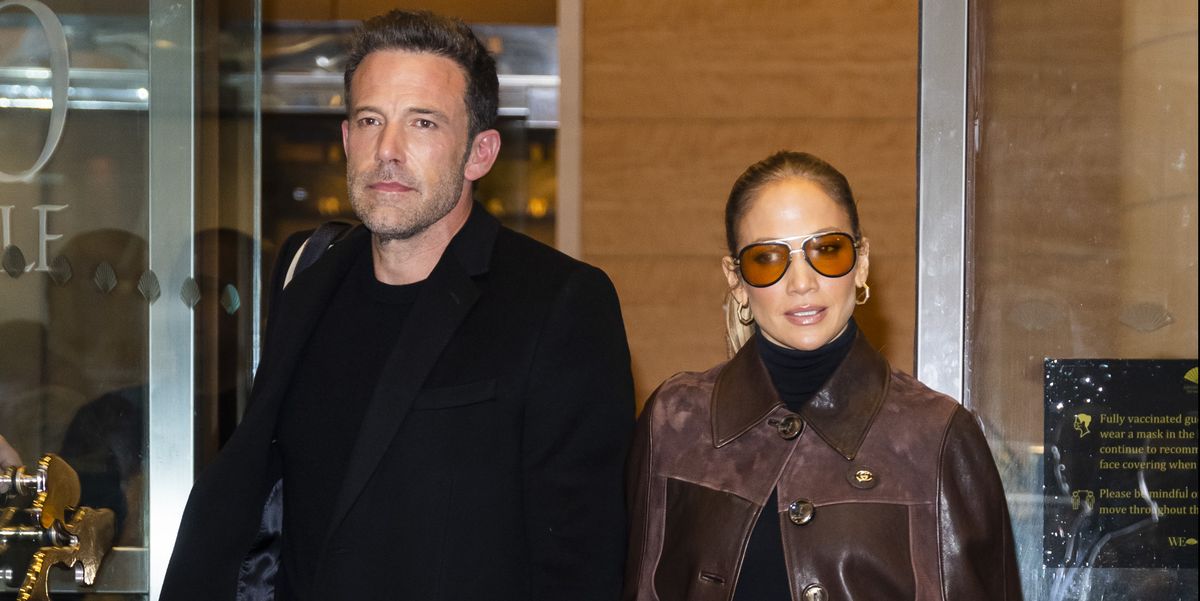
On Wednesday night, Jennifer Lopez arrived in Los Angeles with her 13-year-old twins Max and Emme. The family was likely there to join Lopez’s boyfriend, Ben Affleck, for the Thanksgiving holiday. Lopez recently returned from the much colder climate of British Columbia, Canada, where she was filming her latest project, The Mother.
J. Lo touched down in her private jet wearing a teddy fur coat from Coach’s Autumn/Winter 2019 collection, and a pair of Ugg boots. Classic airplane outfit, celebrity style. Lopez and Affleck originally dated in 2002 and broke up in 2004. Their romance was rekindled earlier this year, soon after Lopez ended her relationship with baseball player Alex Rodriguez. The new couple went official in July, while celebrating Lopez’s 52nd birthday abroad.
Affleck’s most recent relationship with Ana de Armas ended in January after about a year together. He had divorced ex-wife Jennifer Garner in 2015 after being married for almost a decade. Garner and Affleck had three daughters, Violet, Seraphina, and Sam.
Before traveling back to the U.S., Lopez posted a story to Instagram Reels about how grateful she was to be headed home.
“Hey everybody, it’s my last day here shooting on The Mother out in Smithers in the snow, it’s been beautiful, but tonight I’m on my way home,” she said, as she walked through the wild landscape in a black coat and beanie.
“I’m so excited for Thanksgiving! I hope everybody has an amazing weekend with their families and their loved ones, there’s so much to be grateful for this year. I’m on my way!”
This is the first major holiday of the year since Lopez and Affleck reunited, so it’s likely to be a big one for both families.
This content is created and maintained by a third party, and imported onto this page to help users provide their email addresses. You may be able to find more information about this and similar content at piano.io
Fashion
Everlane’s Black Friday Sale is Packed With Winter Essentials
Published
4 years agoon
26 November 2021By
Terry Power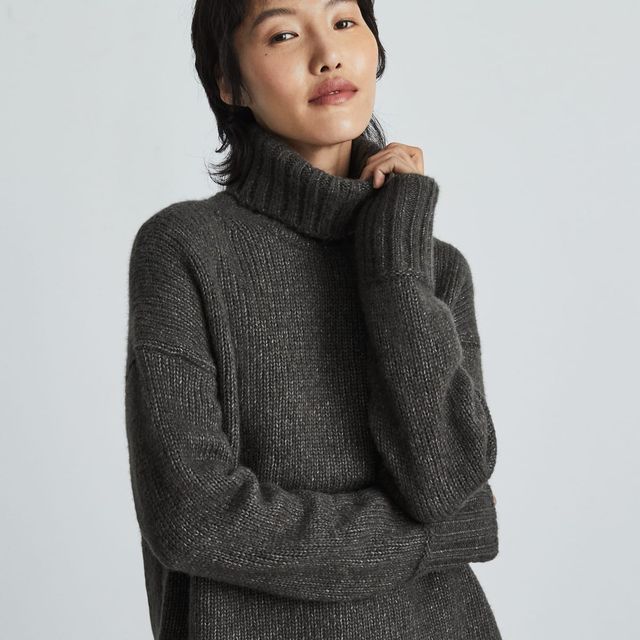
Courtesy
This is not a drill: Everlane just kicked off its Black Friday sale. Now through Monday, November 29, the direct-to-consumer brand is offering 20 to 40% off its cozy sweaters, minimalist activewear, and popular jeans. If you’re not super familiar with Everlane, let me spell it out for you: this is a big deal.
The e-tailer might be known for making sustainable, ethically made clothes and accessories at a fair, affordable price, but Everlane rarely has sales beyond its Choose What You Pay section. So, if you want to stock up on cute basics for less, now’s your time to shop.
And, in true Everlane fashion, the brand is taking this opportunity to give back. Everlane is partnering with Rodale Institute and help U.S. farmers transition their farmland to regenerative organic—and donating $15 per order to the cause. A great sale that gives back? I’m sold.
But, hurry! These deals are going to sell out fast, so you won’t want to waste any time filling your e-cart.
Advertisement – Continue Reading Below
1
The Cloud Turtleneck
$150 $105 (30% off)
Sweater weather is officially here, so why not pick up a few fresh layers? This turtleneck is the S’s: snuggly, stylish, and on sale.
2
The Authentic Stretch High-Rise Skinny Jeans
everlane
$78 $58 (25% off)
Looking for a great pair of jeans, minus the markup? Everlane’s classic skinny style is not only super stretchy, but it’ll look good with everything from chunky sweaters to silky blouses.
3
The ReNew Teddy Slippers
everlane
$65 $39 (40% off)
Why limit the shearling trend to the upper half of your body? These plush slippers will give even your most worn-in sweats a stylish edge.
4
The Chunky Cardigan
everlane
$110 $77 (30% off)
Sure, this may not be the cardigan Taylor Swift was talking about. But, with an exaggerated collar and ribbed finish, this style would definitely score top marks from the singer herself.
5
The Canvas Utility Boots
everlane
$115 $59 (40% off)
Brave the cold weather in style with Everlane’s chic boots. The canvas uppers and thick sole make these an ideal, all-weather option.
6
The Lofty-Knit Henley
everlane
$150 $105 (30% off)
Made with a nubby blend of merino wool, alpaca, and recycled nylon, this henley is perfect for a cozy night in, yet stylish enough to wear in public.
7
The Perform Bike Shorts
everlane
$45 $22 (51% off)
No, you can never have too many stretchy pants. Everlane’s bike shorts ooze major Lady Di vibes — for under $25, no less.
8
The ReLeather Court Sneakers
everlane
$110 $66 (40% off)
Made with recycled leather, these refresh sneakers will serve up major curb appeal — and Mother Nature’s seal of approval.
9
The Field Dress
everlane
$100 $60 (40% off)
Found: a fun, flouncy frock you can wear year-round. For a wintry take, pair with opaque tights and your favorite chunky boots.
10
The Cozy-Stretch Wide-Leg Sweatpants
everlane
$150 $75 (50% off)
With a straight-legged silhouette and wool material, it’s safe to say these are the chicest sweatpants we’ve ever seen. To sweeten an already enticing offer, this pair is half off.
11
The Organic Cotton Flannel Popover
$80 $56 (30% off)
Everlane reimagined the traditional flannel with a cropped silhouette, voluminous sleeves, and a slew of minimalist colors.
12
The Studio Bag
everlane
$275 $192 (30% off)
Large enough to fit all your essentials, but not too big that it’ll weigh you down, Everlane’s Studio Bag is the perfect everyday purse.
13
The ReNew Long Liner
everlane
$158 $118 (25% off)
House Stark was right: winter really is coming. Made with recycled materials, this liner is a great layering piece that’s considerably chicer than the yesteryear’s Michelin Man-worthy parkas.
14
The Felted Merino Beanie
everlane
$50 $30 (40% off)
All set on clothes? Pick up this cheery beanie, which is 40% off its original price.
Kelsey Mulvey is a freelance lifestyle journalist, who covers shopping and deals for Marie Claire, Women’s Health, and Men’s Health, among others.
This content is created and maintained by a third party, and imported onto this page to help users provide their email addresses. You may be able to find more information about this and similar content at piano.io
Advertisement – Continue Reading Below
Fashion
29 Winter Fragrances That Exude Main Character Energy
Published
4 years agoon
26 November 2021By
Terry Power
29 Winter Fragrances That Exude Main Character Energy
